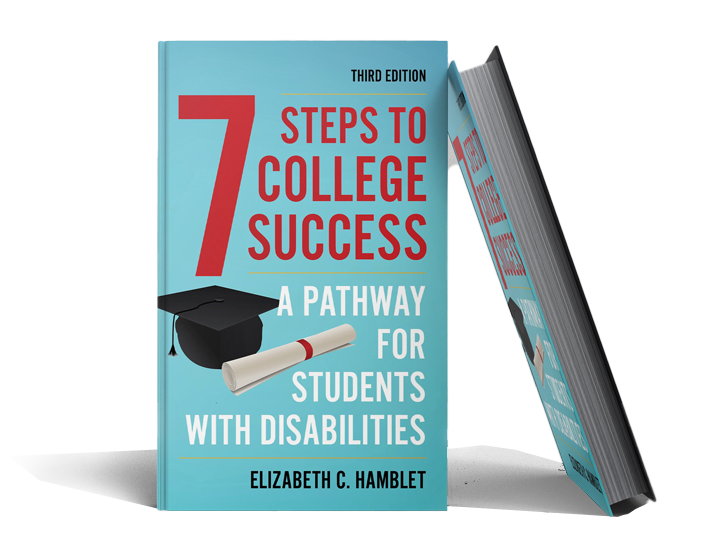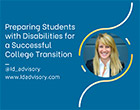Introduction
Self-determination is an important skill for students to develop as they move through high school. One opportunity to exercise it is in the college admissions process, where they may decide to disclose their disability, or not. That decision make should be informed by facts, not conjecture.
Facts are especially important when it comes to the decisions IEP teams make while students are still in high school. Students should have a voice, and the rest of the team should also have the right facts when making decisions about students’ services.
I have taken some of the myths I commonly hear and addressed the assumptions they make about the admissions process, hoping it will help students decide what they would like to do.
Myth 1 – Students should be moved from an IEP to a 504 plan for senior year because it “looks better” when they apply to college
Colleges aren’t allowed to ask students applying for admission whether or not they have a disability; therefore, they don’t ask what kind of plan students have. And even if students choose to disclose their disability when they apply, colleges still won’t ask whether they have an IEP or 504 plan. Therefore, IEP teams should not let students’ plan to attend college (and their decision about disclosure) change the kind of plan they’re on as seniors, or take their services away because they’re worried about how it might affect their chances of getting into college.**
For more on this particular myth, read my post for Understood – “Do colleges view 504 plans better than IEPs?”
Have you heard 504 plans are valid at college? It’s not true.
Myth #2 – High school students should get off any kind of plan (IEP or 504) and stop using special education services and accommodations because it will show on their record, and this will hurt their chances at being admitted to college
Again, colleges can’t ask students about disabilities, but even if they know they won’t say anything, students may wonder whether materials sent by their high school may mention that they had services or accommodations. They should know that it is against the law for transcripts to state that students had an IEP or 504 plan (unless students had a modified curriculum), and school counselors can’t discuss this in their letters without students’ permission
That said, if a student receives credit for a study skills class that is only for students with disabilities, college admissions departments may understand that from the title of the class. (There shouldn’t be an asterisk next to it on the transcript if it is simply a support class.)
It’s impossible to know how each admissions staffer at each college would respond to seeing such a class on a transcript, but don’t assume that this is viewed negatively.* Statistics may be helpful here.
National Center for Education Statistics (NCES) data shows that – of the 707,000 students attending college in the 2008-2009 academic year who reported having a disability – 31% said they had a learning disability and 18% reported having ADHD. (Remember – this data is collected from their self-disclosure after they were admitted to college, not from what they said in their applications.) While it’s important to avoid making too many assumptions, it seems likely that at least some portion of those students had something on their transcript that indicated they received support in high school when they were admitted.
Given these facts, students should not stop using accommodations and services they need in high school fearing that this would be indicated in the school’s materials. And even if they take a support class that will appear on their transcript, they should not assume this will negatively affect their chances.
Myth #3 – Students should disclose their disability when applying to college because there’s a quota of students with disabilities each college has to accept
I hear the quota rumor a lot. It isn’t true, but this doesn’t mean that students who want to disclose their disability should be discouraged from doing so.
*Read Step 5 of my book to see what admissions deans said about disability disclosure in the admissions process and these posts for bonus content from the book on this topic.
Myth #4 – Students should not disclose their disability in their college application because it puts them at a disadvantage
Statements like this assume that every reviewer at every college sees students with disabilities as less capable than their typical peers. This is a generalization people should not make, and it’s not based on evidence.*
When evaluating such claims, just know that there is no publicly available data showing how many students who disclosed a disability while applying to College X did or didn’t get admitted (and it is unlikely College X even collected it). Remember that:
- colleges aren’t allowed to ask students whether they have a disability, and
- not every student who has a disability will disclose that when applying to college
So even if College X did collect data like this, they’d only know how many of the students they accepted (or didn’t) had said they had a disability. They would not know how many of those they had accepted or rejected had a disability and didn’t disclose that information when they applied.
According to the most recent statistics collected by NCES, almost 20 percent of college students reported having a disability in the 2015-2016 academic year. No data exists to show how many of those students disclosed their disability when they applied, but it seems reasonable to think that some of those 3,755,000 students did. (Read what three college students said about their decision to disclose in their applications.)
This means that statements about disclosure damaging students’ college admission prospects are based on assumptions not backed by data; keep that in mind as you consider such advice. If someone who works in admissions at College X tells you how College X views students with disabilities, then take what they say as applying only to that school. Don’t generalize that to apply elsewhere.
Myth #5 – If students haven’t met colleges’ admission criteria, they should disclose their disability because colleges have to adjust their requirements for students with disabilities
Colleges can always choose to accept students who don’t meet their requirements (and, anecdotally, I’ve heard from students who have been accepted who hadn’t met them at certain colleges) , but they are not required to do so. Students may decide it’s worth disclosing anyway. They should just be aware that doing so may not make a difference if the college holds tightly to its entrance requirements.
Myth #6 – Students who don’t want to disclose their disability when they apply to college should do so anyway because colleges’ diversity initiatives mean they’ll be at an advantage
Colleges may be looking to accept more students with disabilities, but no one can tell students how much better chance they might have if they disclose. (Again, because disability disclosure isn’t required, colleges could only count how many students they admitted that told them about their disability when they applied.) This is not meant to discourage students who want to disclose from doing so.* It just means if that if students decide for any reason they don’t wish to disclose, they shouldn’t be pushed to do so based on this idea.
Myth #7 – If students disclose their disability and don’t get into College X, the sole reason for their rejection was that they have a disability
*Statements like this can’t be supported by data. There can be so many reasons why a student with or without a disability gets into a college in any given year. Perhaps the college has created a new major at the school and they are trying to grow it, or the field hockey team needs a goalie. That may not be a big comfort if it’s the college they hoped to attend, but students should not regret their decision to disclose because someone told them that that was the reason they weren’t admitted.
One last point
** Teams should also know that there is no reason to send students’ IEP or 504 plan with their application. Colleges don’t ask to see these as part of the admissions process, except at a few colleges that offer fee-based programs for students with learning disabilities and ADHD where they apply to both simultaneously. See Step 5 of my book for more on this.



